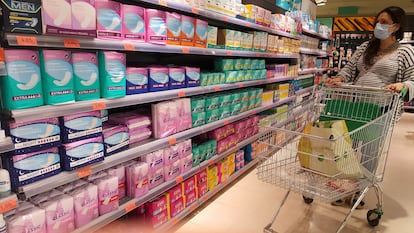Can we really eat our way out of period pain?
There are no foods or diets that are going to alleviate the discomfort of bad days, but there are eating patterns which, if maintained over time, will help improve the situation

As “women’s issues” have become more visible in the media and more of a focus in marketing, our periods and related health care needs have also hit the mainstream. These once-taboo issues have almost become ‘cool,’ with books and podcasts dedicated to them as well as specific training for professionals.
Topics such as endometriosis, polycystic ovary syndrome, adenomyosis and dysmenorrhea (the official scientific name for painful periods) are being publicly discussed at a much greater frequency, even reaching political debate about whether to legislate for specific medical leave for women who experience menstrual pain.
Medical research is finally looking at improving the diagnosis and treatment of the disabling monthly pain experienced by many women who menstruate, beyond the usual prescription of a painkiller or the contraceptive pill.
Indeed, word has it that “women’s problems” is currently a marketing ‘niche’ to be taken advantage of for sales. A 50% of the population niche… to be fair, you’d be crazy not to get in on it! That is when, as always when a new health issue becomes visible, there are those who want to make money out of it by offering miraculous diets and healing supplements, and gurus that promise to fix your problems. Here, we offer a guide to negotiating the advice that is suddenly so ubiquitous in the media.
There are no miracle foods
First of all, the truth is there are no foods where, if you eat them on the days when you’re experiencing painful menstrual cramps, you will get immediate and profound relief.
Where certain foods might help, it is eating them over a period of time as part of a conscious nutritional plan that might lessen menstrual pain overall.
Put another way: any online publication telling you to consume particular foods at the time of your period to reduce pain or discomfort is peddling nothing more than clickbait.
Of course, a healthy diet rich in fruits and vegetables with healthy fats and few ultra-processed foods, plenty of exercise, sufficient rest, and not smoking or drinking alcohol will all help to ease menstrual pain. But that will be because you are leading a healthy life in general.
So you can heal period pain with nutrition?
Existing studies on how diet is related to dysmenorrhea tend to make the point that research on the subject is scarce and variable, with scattered if not inconclusive results. Talking again about 50% of the population, the lack of solid knowledge on something that affects so many people may seem odd.
Still, there is something to be said in all this for the Mediterranean diet. A study published in the journal Nutrients looked at the relationship between the diet traditional to the south of Spain, specifically the fact that it includes two servings of fruit per day and regular doses of olive oil, and period pain. Those who adhered to the latter experienced less pain every month.
A previous study by the same researchers also indicated that the risk of dysmenorrhea was greater in subjects that ate meat than in those who didn’t. On this, it is also notable that a Georgetown University clinical trial showed that menstrual pain decreased in duration and intensity, increasing the concentration of SHBG (sex hormone binding globulin, which helps maintain the body’s hormonal balance), in a sample of women who did not eat meat compared to one that did.
This does not necessarily mean that your period pain will get better if you become a vegetarian, but it does suggest it will not get worse.
So we should adapt our diet to our menstrual cycle?
Then there’s the articles that say what type of food and what amounts we should eat in each phase of the menstrual cycle. This type of planning is totally unnecessary and only adds pressure on women.
It is true that there are metabolic differences in different phases of the cycle that affect, for example, the management of carbohydrates, appetite or energy. But a healthy diet throughout the cycle, with the amount guided by your appetite at the time, is a much more effective and considerably less stressful approach.
What about supplements?
Supplements are a whole other marketing rabbithole, so it’s worth looking at the scientific evidence. A Cochrane review of 27 randomized controlled trials in just over 3,000 women showed that no supplement has been proven to be especially effective, although some obtained tentatively positive results. The latter group includes fenugreek, ginger, valerian, zataria, zinc sulfate, fish oil, and vitamin B1. Overall, healthy eating and the particular consumption of omega-3 is likely to improve symptoms of inflammation and menstrual pain.
‘Just take a painkiller, or the pill’
At any rate, instructions like this are clearly inadequate, and the pain of menstrual problems like endometriosis is now finally becoming something we are talking about. I encourage you to look for books like Invisible Women by Caroline Criado-Perez which show how women’s reproductive health has been overlooked by patriarchal systems of data collection and how poorly the mass media tends to advise us on how to reduce pain and take care of ourselves.
Tu suscripción se está usando en otro dispositivo
¿Quieres añadir otro usuario a tu suscripción?
Si continúas leyendo en este dispositivo, no se podrá leer en el otro.
FlechaTu suscripción se está usando en otro dispositivo y solo puedes acceder a EL PAÍS desde un dispositivo a la vez.
Si quieres compartir tu cuenta, cambia tu suscripción a la modalidad Premium, así podrás añadir otro usuario. Cada uno accederá con su propia cuenta de email, lo que os permitirá personalizar vuestra experiencia en EL PAÍS.
¿Tienes una suscripción de empresa? Accede aquí para contratar más cuentas.
En el caso de no saber quién está usando tu cuenta, te recomendamos cambiar tu contraseña aquí.
Si decides continuar compartiendo tu cuenta, este mensaje se mostrará en tu dispositivo y en el de la otra persona que está usando tu cuenta de forma indefinida, afectando a tu experiencia de lectura. Puedes consultar aquí los términos y condiciones de la suscripción digital.









































